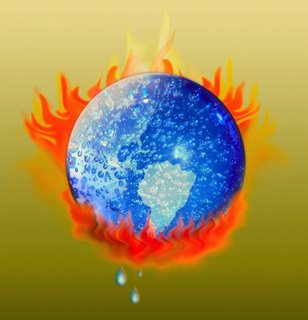 We are told to expect the worst, and to prepare ourselves for great sacrifices and sweeping changes that will effect us not just at the environmental level, but also at a very real economic level. The British government's recent Stern Report makes some very serious claims as to what we have to look forward to, and the future, it seems, is very bleak unless we all make some big changes.
We are told to expect the worst, and to prepare ourselves for great sacrifices and sweeping changes that will effect us not just at the environmental level, but also at a very real economic level. The British government's recent Stern Report makes some very serious claims as to what we have to look forward to, and the future, it seems, is very bleak unless we all make some big changes.
Temperatures, we are told, are to increase by 3.6 degrees by the middle of the century, resulting in melting glaciers, flooding and choked water supplies that will threaten the livelihood of millions. Crops will fail, we are told, disease will run rampant, rising sea levels and intense droughts will create hundreds of millions of refugees, and up to 40% of species will face extinction.
The claims are biblical in scale, and filled with the apocalyptic fire and brimstone of Revelations.
Humanity's emissions of greenhouse gases are likely to cause rapid climate change. Carbon dioxide is produced when fossil fuels are burned, and its effects intensify when carbon-dioxide-absorbent forests are cut down. Methane and nitrous oxide are released as a result of agricultural practices, changes in land use and other causes. Chlorofluorocarbons (CFCs) and other gases also play a role in trapping heat in the atmosphere. By thickening the atmospheric "blanket" of greenhouse gases, mankind's emissions are upsetting the energy flows that drive the climate system.
Climate models predict that the global temperature will rise by about 1 - 3.5C by 2100. This projection is based on current emissions trends and contains many uncertainties, particularly at the regional level. Because the climate does not respond immediately to greenhouse gas emissions, it will continue to change for hundreds of years after atmospheric concentrations have stabilized. Meanwhile, rapid and unexpected climate transitions cannot be ruled out. There is evidence that climate change may have already begun.
Climate change will have powerful effects on the global environment. In general, the faster the climate changes, the greater will be the risk of damage. If current trends continue, the mean sea level is expected to rise some 15-95 cm by 2100, causing flooding and other damage. Climate zones (and thus ecosystems and agricultural zones) could shift towards the poles by 150-550 km in the mid-latitude regions. Forests, deserts, rangelands and other unmanaged ecosystems could become wetter, drier, hotter or colder. As a result, many will decline or fragment, and individual species will become extinct.
Human society will face new risks and pressures. Global food security is unlikely to be threatened, but some regions may experience food shortages and hunger. Water resources will be affected as precipitation and evaporation patterns change around the world. Physical infrastructure will be damaged, particularly by sea-level rise and by extreme events, which may increase in frequency and intensity in some regions. Economic activities, human settlements and human health will experience many direct and indirect effects. The poor are the most vulnerable to the negative effects of climate change.
http://www.un.org/ecosocdev/geninfo/sustdev/climate.htm















No comments:
Post a Comment